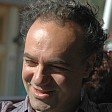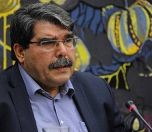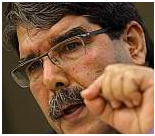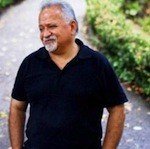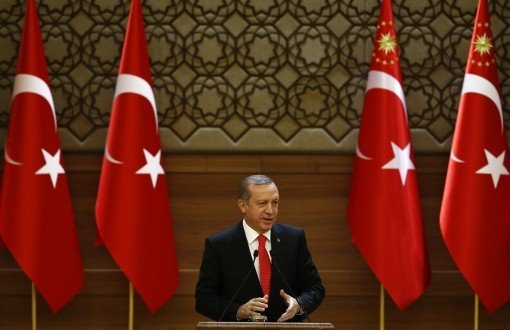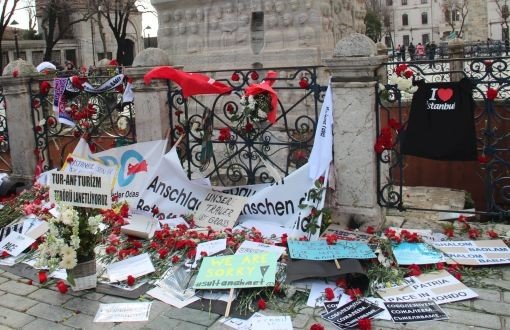bianet interviewed PYD co-chairman Salih Müslim on Geneva 2 Conference, discussed the Syrian issue 2 Conference in Geneva, developments in Rojava, Turkey's attitude and the future of Syria.
“Syrian Opposition and the National Coalition of Revolutionary Forces [two groups that attended in Geneva 2 talks] don’t represent the Syrian people. Their selection of delegations is even dictatorial. In Rojava, we created a model that everyone agreed and it may be a federal model for Syria,” he said.
Kurds could attend as an independent entity Geneva 2...
We should explain something in this issue. Neither Kurds nor we a problem to participate independently. Since the beginning, we are negotiating in order to bring democracy and freedom to Syria. So it is being done for the people of Syria. Therefore we wanted to have a real opposition in the conference.
There were three main opposition groups: National Coordination Body Syrian Opposition and the National Coalition of Revolutionary Forces and the Kurds. We want all of them to attend the talks. However Brahimi recommended that the opposition attended the talks only with one delegation. We agreed to that, however we also urged the Kurdish issue to be recognized prior to Geneva 2 talks.
Second, we also came froth that these three groups must come together and form the delegation under the umbrella of this coalition and not under the umbrella of any of these groups. However, we came to the understanding that they are rushing this process into something. They sent out a letter to Carba, saying that all groups must be under his group. They even gave the names of those who will be selected for the delegation.
Now we only have representatives from the regime and other stakeholders that are part of this game. The people of Syria is not at the table in Geneva 2 talks. Syria regime representatives are negotiating with international stakeholders. This coalition does not represent the people of Syria.
What will be the consequences of Geneva 2? Do you have any expectations?
The coalition has been formed not in Syria, but outside Syria. All groups, whether inside or outside Syria, are not far away from the problems of Syrian people. Also, none of the groups receive orders from the coalition.
Let’s say that these representatives will make decisions, for example a ceasefire. But, who will establish this ceasefire? Islamic State of Iraq Damascus doesn’t listen to anyone anyway. It is also the case for other groups.
When a ceasefire will be at stake, maybe the [Asad] regime will calm down its forces, but who from the Geneva stakeholders is going to calm down the other groups?
How will Rojava Kurds will position themselves then?
When the armed clashes broke out in Syria, we said we wouldn’t be a part of this. On one had, we had the butcher regime, on the other hand we had the Salafis under whatever mask they carry. We said we would defend ourselves, therefore we started organizing ourselves.
Lastly, Temporary Executive Assembly took certain decisions. This entity represents various faction of the society: Assyrians, Arabs, Turkmens, Kurds. They all decided on the establishment of this entity.
If the situation remains in Syria, peace will come in years. We have to defend ourselves, we can’t stay unprotected. Therefore, we wanted to bring order to our region.
Cizira and Kobani kantons declared their autonomy. What will happen next?
Efrin will also do so.
We want to bring order to our own life. However, we don’t know where this process will end. It is also possible that a federal Syria will shape. Kurds, Christians, etc. There are many groups, but we can only live together if we do it voluntarily. A lot of blood has been shed though, nobody can force each other from now on. The best option is a federative structure where each party will guard its autonomy.
We are now protecting ourselves, this is a temporary need but it can be different in the future with federative structure. For instance, there are three different languages in Cizre kanton: Kurdish, Arabic and Assyrian. If the people agree with that, so do the defense forces. We have lost 3 people recently who were with Arab background. They are also a part of YPG (Defense Forces of the People.
How can Turkey react to this?
We have yet to establish direct contacts but the signs are not that good.
Syria is boiling and there are casualties from all sides. We are hoping that our borders are safe. And that comes with our control. So far, no bullet from the Kurdish territories has been fired to the north to Turkey.
Therefore, Turkey must support this. We want and hope this to happen. This is the way to establish security.
But Turkey thinks the opposite. Last year, Islamic State of Iraq Damascus arrived in Syria through Turkey. They are receiving support from Turkey. If you are talking about Turkmen people, they are also with us under the umbrella of YPG.
PM Erdoğan ve FM Davutoğlu came to Bruxelles. They both said that they were fighting against Al Qaeda with PYD. We don’t know. We never declared war on anyone. Why did they compare PYD and Al Qaeda in the first place? One is an ally and other is the enemy of all humanity.
We never want to become enemies with Turkey or Turkey’s people. We are defending ourselves, those groups are attacking us and they are protecting these groups.
Will Turkey’s peace process affect Rojava?
Of course, we would like to see the peace come in Turkey.
But we are talking about two different processes, but they will certainly affect each other. Nobody lend us a hand, only Kurds helped us in the south as well as north and east. If the Turkish government takes a step forward, it will win the hearts of 40 million people. If it reacts in a hostile way, it will at least draw antipathy. Therefore, we can improve our relations. There is embargo on us. There is no medical supply. If we do something, it will be for the good of all people in the region. (YY/BM)




